The Evaluation of STEP
Scientific evaluations show that STEP has positive short- and long-term effects on students’ entrepreneurial behavior. STEP kick-starts the students’ entrepreneurial careers. More importantly, the studies demonstrated that the positive impact sustains over several years.
We use randomized controlled trials (RCT) to assess the impact of STEP. This means that our evaluation studies use the gold standard to assess the impact of interventions and comply with the highest scientific standards. Using a randomized controlled trial, applicants are randomly selected into a training group and control group. This guarantees that the students in both groups are equivalent before the training and all differences after the training can be attributed to STEP. Furthermore, we conduct a pre-training measurement and several post-training measurements to assess the long-term impact of STEP over several years.
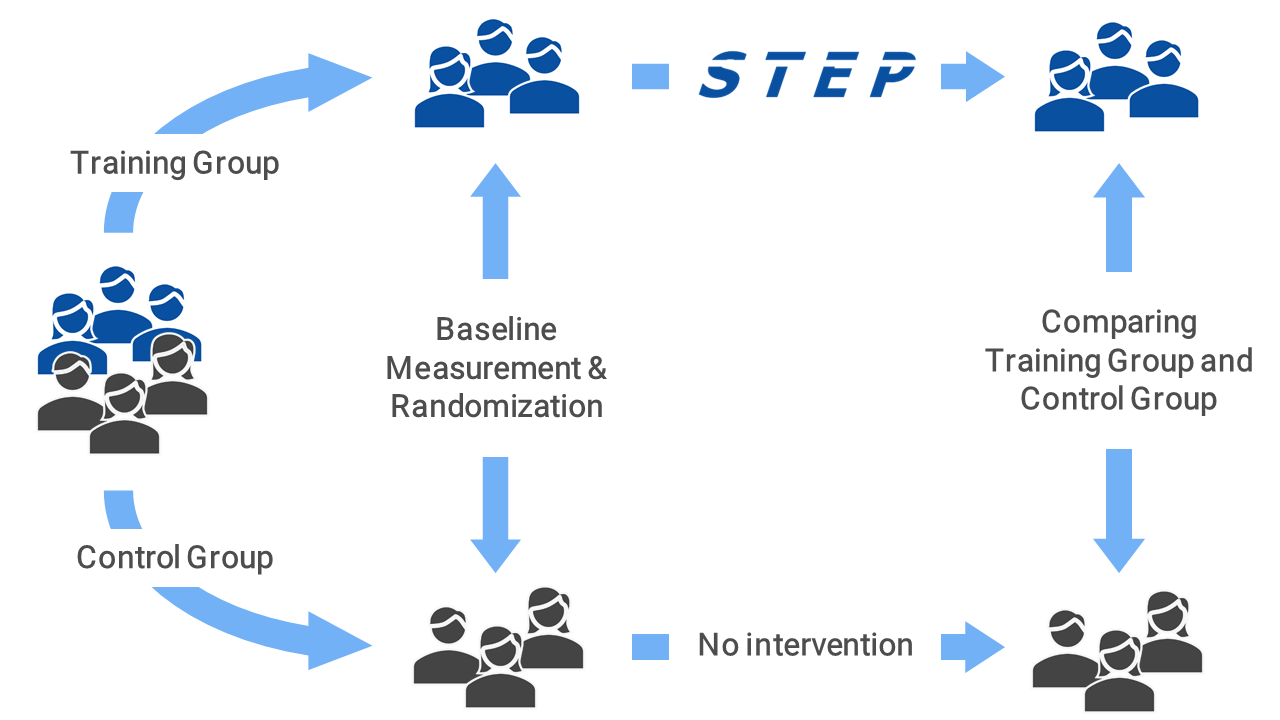
The Most Important Findings
More business creation
STEP students own 33% more businesses two years after the training.
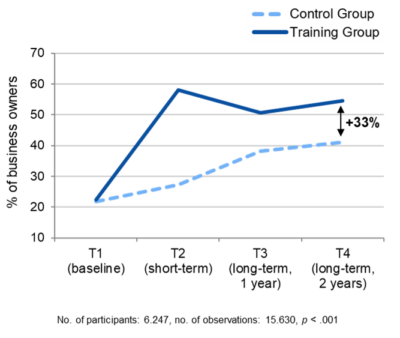
Higher total income
STEP students earn a 10% higher income two years after the training.
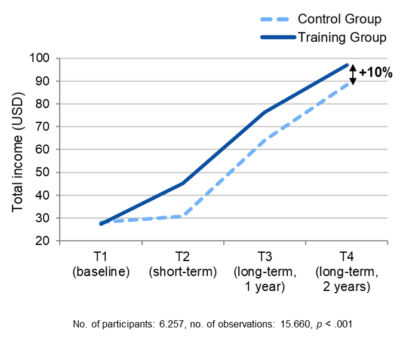
Stronger entrepreneurial mindset
The evaluation studies also revealed mechanisms underlying the positive impact of STEP on business creation. STEP students develop a stronger entrepreneurial mindset. This means that STEP enhances students’ intentions to start a business, the confidence in their entrepreneurial skills, their knowledge about how to start a business, and their action planning for starting a new business. The stronger entrepreneurial mind-set results in students identifying more business opportunities and performing more start-up activities to start a new business.
Higher entrepreneurial passion
Evaluation studies also showed that STEP compensates for a lack of financial capital in the start-up process and boosts and sustains students’ passion for entrepreneurship, which translates into higher business creation in the long-run. STEP thus impacts on a broad range of positive outcomes.
Success Stories
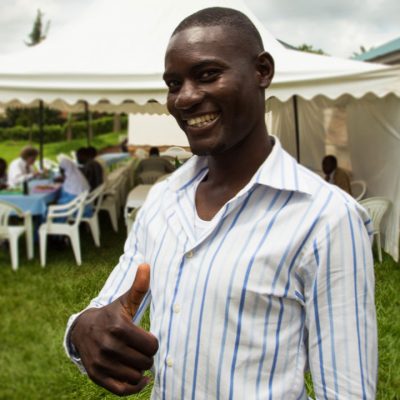
Martin – Developing a never-give-up-attitude
“Nansana is a busy town but we had to walk a long distance to have lunch. I got funds from my sister and some friends and opened-up a restaurant. I made good money that I could use to set-up a second business.”
Martin had been thinking about becoming an entrepreneur for his whole life because he could not imagine being satisfied with becoming “the employee of the month”. However, he had never tried to become self-employed because he feared that he lacked the practical skills. He explained that he had some knowledge in entrepreneurship but did not know how to put it into practice and, hence, never started a business. Asked about the most important learning experiences, Martin said that the training taught him how to plan and execute the start-up of a business, how to develop financial plans, and how to manage finances. After the training, Martin started a restaurant in a town near the capital of Uganda, recognizing a lack of restaurants in the local market. Martin identified the business idea of a restaurant during the STEP training, in which he sold fresh juice together with the other members of the start-up team. He opened the restaurant about eight months after the training. When we met him 18 months after the training, he managed his restaurant successfully and made about 380 USD sales per month. He employed five persons, two full-time employees, and three part-time employees. In addition to the restaurant, Martin started a boutique that sold clothes and shoes for women and children 15 months after the training. The business was located in his parents’ home village some hours away from Kampala. Martin also identified the opportunity to start a company supplying construction materials but because of the high capital requirements, he was not yet able to start operations. Martin mentioned that despite the high amount of starting capital, he would not give up on that business opportunity.
After some time Martin faced sudden setbacks and difficult challenges. Four years after the training, he mentioned that he had also opened up a small hotel. His workload from managing several businesses at the same time had been very high. Furthermore, the hotel incurred losses and Martin lost a high amount of money. Despite the fact that he had diligently planned the different steps to start and run the businesses, he had to close the hotel. He explained that the training was a crucial factor in deciding to continue with entrepreneurship because STEP gave him the determination and courage to do so. After the training, his most important principle became “never give up”. This determination and persistence resulted in new businesses and in employment opportunities that he created for himself and other people. Martin had to close one business but was able to continue running his other businesses. He wanted to use the profits to create new businesses that start small and grow over time. Martin persisted in his entrepreneurial ventures and became a successful serial entrepreneur.
Msafiri – An innovative fashion business to preserve Tanzanian culture
“Due to the huge international influence on Tanzanian fashion market Msafiri felt as a part of Tanzanian culture was lost. He wanted to do his part in preserving his culture – and his business idea was born.”
Msafiri Raphael attended a Bachelor of Commerce in Finance at Dar es Salaam Business School and graduated in 2016. The first time he appeared in our office, he had his iPad and smartphone in his hands, wearing a sort of traditional African material but still fashioned t-shirt, and seemed to be busy and distracted. However, when we started our conversation it became clear that his general appearance was a clever move to guide our views towards his clothing. He was challenging our intuitive thinking by appearing like a busy sales-person but wearing traditional fabric clothes.
During our conversation Msafiri explained that he started a small tailor’s shop in Dar es Salaam market district Mwenge after he graduated. Throughout his studies he dreamed of working in a big international corporation leaving his home town or even Tanzania. However, as he graduated the opportunities to find a job in a big corporation were very low. He and his fellow students were struggling to find jobs and thus many of them were pushed to make use of their own business ideas. Msafiri was born in a small town close to Moshi. His father was a tailor, which affected Msafiri’s early understanding of clothing and dressing. Throughout his childhood he learned to distinguish good and bad materials. He developed his own understanding of how clothes should fit to their wearer. However, when he started his Bachelor in Dar es Salaam he recognized different international influences on the Tanzanian clothes market. Second-hand clothes from Europe were sold on Dar es Salaam markets and shaped the fashion in the city. This gave Msafiri the feeling of losing a part of Tanzanian culture. He thus developed the idea to produce customized fashion using European cuts and traditional Tanzanian fabrics.
Shortly before Msafiri graduated, he decided to make use of his idea. As his father had some contacts in Dar es Salaam, it was quite easy for Msafiri to start. First, he had one tailor who was tailoring the clothes for him. Msafiri was doing the marketing, getting customers and discussing the different cuts and fabrics with them. After he graduated he tried to scale up his plans. Second, he was looking for a shop close to a crowded market region in Mwenge. After his customer base was big enough and his tailor was overstrained by the different orders, Msafiri decided to employ two other tailors. As his shop was located very close to the market, Msafiri was able to look for different fabrics with his customers without needing his own big fabric stock. In his first business year Msafiri produced dresses, suits, bags and all kinds of clothes. He combined “western” trends and traditional Tanzanian fabrics which gave his designs a very special touch.
Today Msafiri empoys six tailors in his small shop in Mwenge. By producing about 100 different customized clothes per month, Msafiri’s shop has a monthly turnover of about 3.5 million TZS. His own monthly salary is about 500.000 TZS which equates to an average monthly salary of a big corporation. In early 2017 Msafiri started to produce his first non-customized products for foreign markets. Due to international contacts he made at university, he received the possibility to send clothes abroad and immerge in new markets. The STEP training gave Msafiri the opportunity and skills to make use of his business idea. Today, he can be seen as a very successful entrepreneur, knowing his market and designing a sustaining business strategy. In our call he mentioned that he will have some problems in further scaling his business in the future, as tailored fashion is very individual and requires a lot of customer service. However, he also stated that through the knowledge he gained by attending the STEP training, he will be able to enhance his business model and strategy.
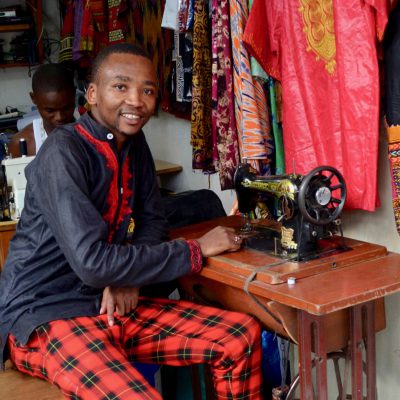
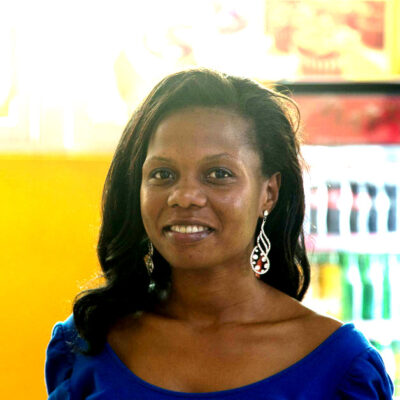
Janet – A successful portfolio entrepreneur from Uganda
“I learned how to overcome challenges. If your business collapses, you must start anew. Think what the problem was, what made the business collapse, then start anew. You can use the people around you to get starting capital. You don’t have to go to banks, people can supply you. It was helpful that we learned how to approach people.”
Janet was typical of many students in Uganda. Before the training, she had not been involved in any entrepreneurial ventures, and she had not attended any prior entrepreneurship courses. Janet knew that the job market conditions were poor for her even with a university degree, but she did not consider becoming an entrepreneur as an attractive and feasible career option for her. She was afraid of the challenges entrepreneurs face. According to her report, starting and running a business in the training was a “totally new experience”. The experience that it is possible to overcome the challenges of entrepreneurship and to successfully operate a business “opened her eyes”, as she said. Janet elaborated that the training was a turning point in her life, which changed her belief that entrepreneurship is an insurmountable series of tasks. She also explained that she learned to reflect after failures, learned from errors, and that she learned to start anew despite of unfavorable circumstances. She developed a “never-give-up” attitude and learned to use errors and failures as a valuable source of feedback. After the training, Janet started a poultry farm and managed to supply retail shops and hotels in Uganda’s capital city Kampala with eggs and chickens. One year after the training, she employed five full-time employees. The poultry farm was located in a village some hours away from Kampala, where she lived with her husband. Commuting between the village and Kampala was demanding. She decided to sell the farm and start an event management business, which she successfully set up 18 months after the training.
Janet closed the event management business 24 months after the training and, instead, launched an information technology consultancy that developed computer software, designed webpages for companies and private persons, and installed networks for offices and homes. Janet had started the information technology consultancy because of her university education in computer science. It is interesting to observe that she had started with a business of low complexity, and over the years, she created a business in her field of study. When we met Jane again around four years after the training, she informed us that she still owned the information technology consultancy. Furthermore, she had started an additional business – one of the few ice cream parlors that you can find in the city center of Kampala. Through STEP, Janet has formed and pursued different entrepreneurial goals; she has changed from a non-entrepreneurial student to a successful portfolio entrepreneur starting and managing several businesses at the same time.
Popcorn Parlour – From friends to successful business partners
“STEP did not only teach the five friends the necessary skills and knowledge to successfully run a business, but also offered room to practically develop their business ideas and promoted their self-confidence.”
The group members Robin Murimi, Hellen Kariuki, Stephen Ngugi, Terry Nissi Wambui and Ibrahim Faruq were already friends before the STEP training started. After receiving the starting capital, it took them a while to come up with a promising business idea. The group interviewed their parents, friends and colleagues for inspiration and decided to sell flavoured popcorn to fill a market gap in the area. In the next step they started Google research for recipes and asked students of Mount Kenya University for their favourite flavour before they started experimenting. Besides chocolate, which was the most popular one, they also produced caramel, strawberry, ginger, mint, lemon, honey, etc. flavoured popcorn. Throughout the training their variety of popcorn expanded due to customers’ requests. Once a customer asked for plantain flavoured popcorn which the group is yet to produce.
At the beginning of the training the group would meet almost every evening at friends’ rental houses to make the popcorn. Each group member had their own task in the company such as CEO, secretary and packaging manager, but the popcorn was produced, flavoured and packed by all of them together. The group sold the packed popcorn on the streets and in the university but mainly they knocked at doors, talking to customers directly. Robin said: “interacting with people was the most fun part.” In the sales process they saved the customers mobile numbers and started to produce by order. They developed a huge customer network. For special occasions the group developed special popcorn. For example, on valentine’s day they made chocolate flavoured red coloured popcorn with “happy valentine” stickers and made a profit of 5000 KSH (ca. 40 Euro).
The group bought 1 KG of corn in the supermarkets for 200 KSH (ca. 1,60 Euro) which they sold in one day for 2220 KSH (ca. 18 Euro). At the end of the training they made a profit of 26.000 KSH (ca. 209 Euro). The profit was used to pay each group member a salary, to buy further stocks of corn and the rest was saved for the business. After the STEP training was finished, the group decided to keep the Popcorn Parlour running. One of their future plans is to sell popcorn at cinemas. There are two cinemas in Thika and they have already contacted one of the owners to discuss the selling. Furthermore, they want to register the business and open their own shop called “popcorn inn” one day. “Popcorn inn” shall be a chain of shops across the country in the future.
The students are very thankful for the opportunity of joining the STEP training. They learned a lot, especially concerning the business plan and registration. In the classes the students felt the lecturers were dealing with every single one of them which they really appreciated. The classes were interactive and therefore they were able to practically develop their ideas. The group members gained a lot of self-confidence throughout the STEP training and their entrepreneurial experiences to continue with their popcorn business. In the long run, the students believe they are capable of successfully starting another business on their own, maybe even in their field of studies. The STEP training supported the students to go their own way and become entrepreneurs.
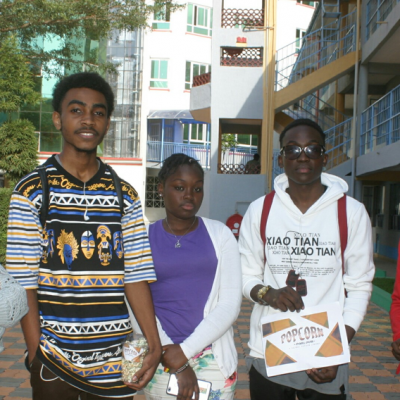
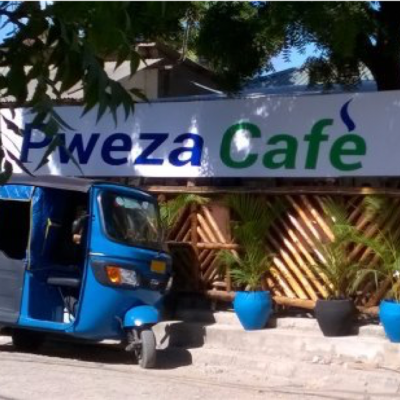
Pascal – Filling a market gap
“Pascal Mshanga has 3 advises for new business owners: First, be passionate about what you do. Second, know the industry you are going to enter. And third, make your business unique.”
Pascal Mshanga is 25 years old and currently studies Bachelor of Law at the University of Dar Es Salaam (Tanzania). In 2015 he participated in the STEP training, by now he owns a restaurant. His restaurant is named Pweza Café; pweza is the Swahili word for octopus. The name derives from the kind of food he is offering: he sells seafood like local fish and the eponymous octopus which he gets from the fish market in town.
The idea was born one day when he walked around with his friends after work, looking for seafood. Suddenly he realized that in this area there was no restaurant offering such food, hence he decided to open up a seafood restaurant.
Before he actually started the business, he shared the idea with some of his friends. He asked the ones who are business owners themselves, to get professional feedback and different points of view on the subject. Since his friends supported him in his intention, he decided to take the risk. He started with doing market research, looked for a suitable location and made detailed plans. When starting his business, several challenges emerged. There were bureaucratic aspects like getting the demanded licenses and financial issues such as getting starting capital and coming up with money for renovation expenses as well as the rent fee. But due to his determination and the support by friends and colleagues from the university he did not give up and finally opened his very own seafood restaurant in December 2015. His customers enjoy well prepared seafood in a classy atmosphere, entertained by radio or TV. If they are not able to stay they can even order take away food or make use of the delivery service.
By 2015, Pascal made about 154$ sales per month, payed himself a salary of 68$ and had one full-time employee. One of the challenges he is still facing is the time management aspect as he is still studying at university besides being a business owner. That is why he has to split his time carefully to ensure that his studies as well as the restaurant get the needed amount of attention.
The STEP training helped him a lot in solving this problem as well as many other problems. For instance, the STEP training made him understand the key business aspects such as marketing, accounting and book keeping. Furthermore, he was taught how to conduct a market research prior to the establishment of a business. But the most important thing he learned is to take a risk. And that is exactly what he did. Successfully. Therefore, his future plan is to expand his business to other parts of the country to reach a wider population.
If he could give three advices to someone who wants to start a new business his advices would be the following: First, you have to be passionate. Don’t start a business just because of the profit but love what you do. Second, you have to understand the industry you want to work in. Knowing the industry and the dynamics involved is vital. Third, you have to think of something which makes your business unique. You should carefully analyze the market, particularly your potential competitors. Only then you can develop new marketing styles to top everyone else.
YANA Trekkers – Establishing trust is key
“The students are very thankful for this once-in-a-lifetime opportunity of joining the STEP training. It made them understand that running a business is not only a constant challenge between continuing and giving up but also a special and desired opportunity to grow.”
During the STEP program at Strathmore University in 2018, Alex Mbogo, Charles Muathe, Daisy Mwende, Edwin Magalasia, and Nick Gahire came up with the idea of starting a travel agency. In the very beginning, every team member tried to pitch their own business ideas, but then they began to evaluate every members’ interests and needs. Among all business ideas, they decided on starting a travel agency named YANA Trekkers. This decision was mainly driven by the vision to create a sustainable business. The name YANA means “You Are Never Alone” and derives from the values and principles their business shares: “We are team-driven by our passion towards nature. Our focus is to offer travel packages that are fun and memorable.” Besides affordable travel packages they offer team building, travel logistics, and well captured moments.
The early-stage startup faced several setbacks and difficult challenges. According to their report, the most significant challenge was to establish a trustworthy brand. As they had to cancel their first trip due to a lack of customers, they identified that marketing was a crucial factor to promote trust. Hence, they developed several strategies in order to change the brand perception. By now, they undertake professional and targeted marketing activities on Facebook and Instagram (look for YANA trekkers!).
Their second trip aimed at promoting trust and at attracting new customers by sharing photos and videos via social media. They succeeded in increasing trust, winning more profitable deals, and attracting new clients for their upcoming third trip. By the end of the training, they worked on a business plan and a website to make their business grow further. One of the team members compared the development of their business to a journey: “It has been a journey for us up to right now, a journey of mistakes and successes at the same time. We have learned a lot and worked hard during this time.”
In the long run, their main target is to register their business, to professionalize their service, and to win a title of Kenya’s best touring company. Their future vision is to show Kenyans that Africa with its beautiful culture is a continent worth visiting. With an eye to fulfilling the vision of changing Kenya’s travel industry, they plan to use and develop new technologies.
The students are very thankful for this once-in-a-lifetime opportunity of joining the STEP training. It made them understand that running a business is not only a constant challenge between continuing and giving up but also a special and desired opportunity to grow. Every session of the STEP training took them one STEP further on the long way of becoming successful entrepreneurs: “Every lesson I have had something to take home.” In general, the training taught them strategic planning skills. In particular, the session on bookkeeping helped them to separate their personal from their business money and to understand that they have to pay themselves a salary. In addition, the team members experienced a valuable mindset change and developed a never-give-up attitude: “The STEP training taught us not to give up when things are not working. It pushed us to stay with an idea and push it until it happens.” Altogether, they appreciated that the training was of a practical nature, which facilitated the transfer of knowledge and skills acquired inside the classroom to their real-life business. They are convinced that STEP is a valuable impetus to start a business, but equally depends on self-initiative. After completing the STEP training one group member told us: “I really want to do business in the future, so I was like if I don’t do it know there won’t be a right time.”
Asked to give three advices for future STEP students, they stated the following: “Firstly, there is power in team. Secondly, 100 USD is a lot of money and even if someone has an idea that requires more starting capital they can break it down. Lastly, just start!”
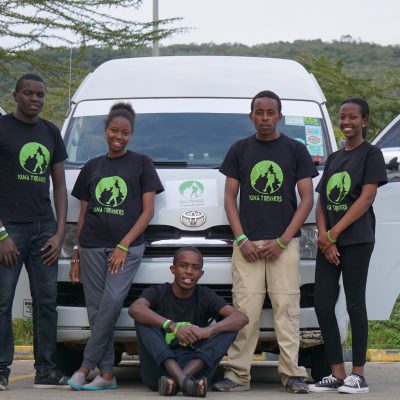

Dennis Ngeno – The importance of risk evaluation
“Dennis Ngeno early realized that he has a burning desire to be his own boss and to decide independently what to do with his time and how to organize himself. The STEP program brought him one step closer to his goal: to be self-employed, running a very successful business.”
Dennis Ngeno early realized that he has a burning desire to be his own boss and to decide independently what to do with his time and how to organize himself. The STEP program brought him one step closer to his goal: to be self-employed, running a very successful business.
Today, he owns a company that (among other services) takes care of the water provision at larger events. He identified this business opportunity during the STEP program by analyzing his own resources, the market conditions and potential customers. With this business, he did not only employ himself, but he also created jobs for three permanent employees. Depending on the season and the workload, he sometimes even employs up to six persons. Right now, he is still in school and runs his business from there. Once he is done with books, he plans to fully concentrate on his business. Furthermore, due to the previous success of his business, Dennis even aims to further expand the business in the near future.
He states, that the STEP program taught him (among others) the skill of risk evaluation, which he did not possess before. He learnt that entrepreneurship is about more than administration of capital, but also includes the consideration of different market factors, in-depth analyses of costumers and the specific target group, and the relationship of supply and demand. He also learnt how to address challenges and that it is mostly best to face them systematically. For an entrepreneur, it is essential to detect potential risks early enough to initiate counter-measures before a risk becomes life-threatening for the business. Dennis explains that the STEP program helped him a great deal in preparing for challenges, finding a way out of risky situations and planning far ahead, for example by writing a business plan.
Lastly, he has an advice for youths, who find themselves in a similar situation to his. He recommends not to be scared of new ventures. Starting with a small manageable risk can still lead to success. From there on, business risk as well as success can easily grow.
Where STEP is Implemented
- Makerere University
- Uganda Christian University
- Uganda Martyrs University
- Nakawa Vocational Training Institute
- St. Joseph’s Secondary School
- Lesotho Agricultural College
- Limkokwing University of Creative Technology
- Lerotholi Politechnic
- University of Limpopo
- University of Venda
- University of the Western Cape
- Kenyatta University
- Mount Kenya University
- Strathmore University
- University of Rwanda
- University of Dar es Salaam
- University of Liberia
- Godfrey Okoye University
- Instituto Tecnológico Autónom de México (ITAM)
- Instituto Gustavo A. Madero (Tecnológical Nacional de México)
- Instituto Tecnológico de Puebla (Tecnológico Nacional de México)
- Bicol University
- AZM University
Partner Institutions
Institutions in Uganda
MAKARERE UNIVERSITY
Makerere University in Kampala (Uganda) was the first place of implementation of the STEP training. Makerere University is one of the major universities in East Africa with internationally renowned scholars. In 2006, the team from Leuphana University led several discussions with scholars from Makerere University to initiate the STEP project. The overarching objective was to provide a solution to the adverse labor conditions for undergraduate students by developing an entrepreneurship training. In the following two years, the STEP training was developed in cooperation with scholars from Makerere University, Makerere University Business School, Uganda Christian University, and Kyambogo University.
Given the key role of Makerere University in the region, it was clear that the STEP training should take place at Makerere University. In 2008, the students of Makerere University were informed about the opportunity to take part in the first STEP training. This led to an overwhelming response with several hundred students applying for the training. Makerere University is thus the first university to have offered the STEP training to its students. The STEP training was successfully implemented and led to the first generation of students who became enthusiastic about entrepreneurship because of STEP. The STEP training clearly made a difference, which has been shown in several interviews we have conducted with the students over several years. All partners agreed that the training provides an answer to the adverse labor market conditions and that more students from different generations and at different institutions should benefit from the training. This was the impetus for extending STEP to other institutions and regions.
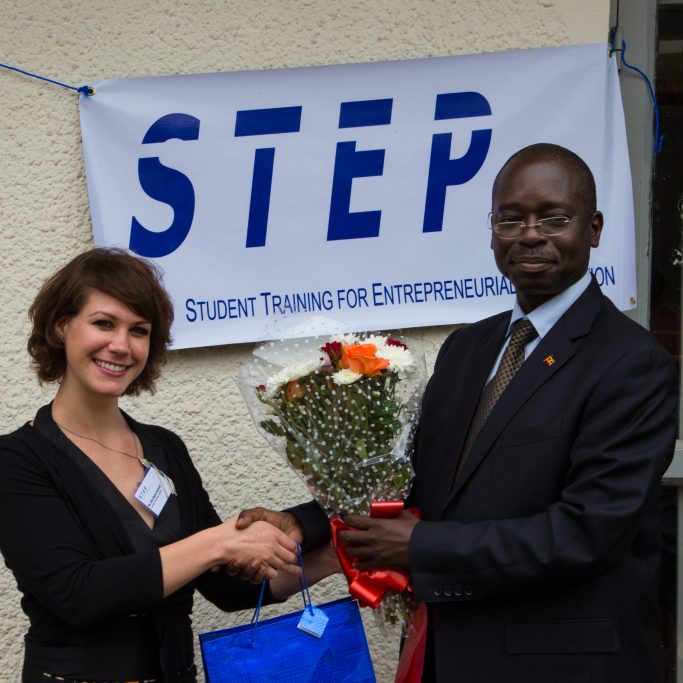
UGANDA CHRISTIAN UNIVERSITY
Uganda Christian University is a main partner and belongs to the initial team of institutions taking part in the development of the STEP training. Uganda Christian University was one of the drivers and provided invaluable contributions in all phases of the development of STEP. Therefore, it was clear that students of Uganda Christian University should take part in the first round of STEP. At the same time that the STEP training was implemented at Makerere University, the STEP training was also run with students from Uganda Christian University. The students keenly adopted the idea of entrepreneurship and pursuing a career as a self-employed business owner. The positive results prompted Uganda Christian University to offer the training on a continuous basis. Uganda Christian University was the first university to offer and manage a second round of the STEP training in a semi-autonomous manner with only very little support from the Leuphana team. This showed that universities can easily adopt and run the training by their own if they take ownership and commit themselves to providing practical entrepreneurship training to their students.
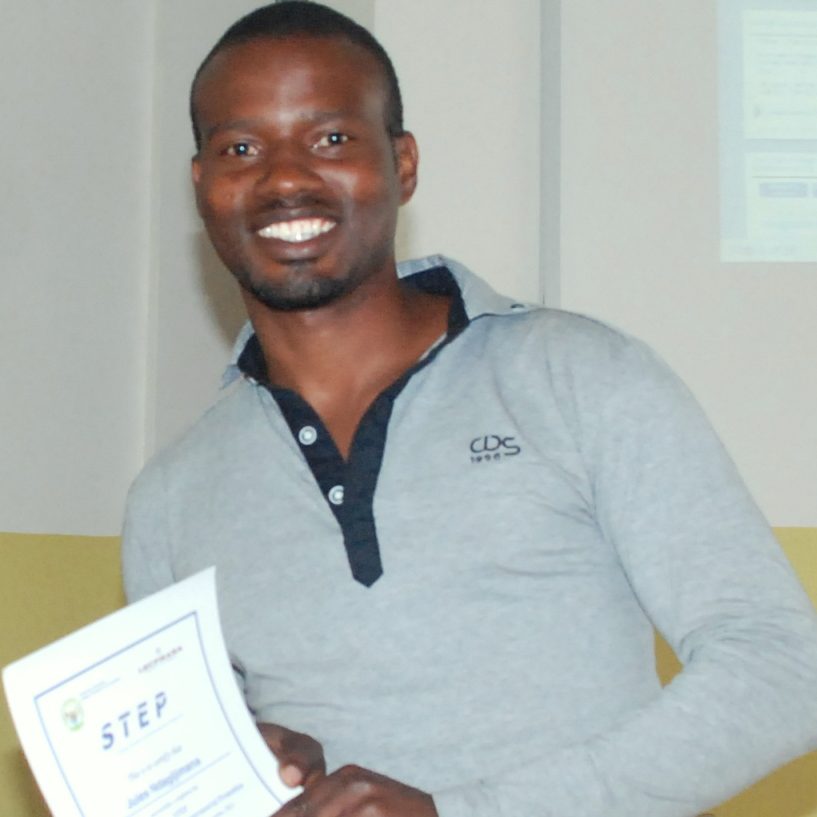
NAKAWA VOCATIONAL TRAINING INSTITUTE
The Nakawa Vocational Training Institute was the first educational institution to implement the STEP training outside the university context. The STEP project seeks to train people at different educational levels. University students is an important group, however, students at other institutions are also in need of entrepreneurial skills. The implementation of the STEP training at the Nakawa Vocational Training Institute was an important step to extend the training to other contexts. The implementation showed that the training concept is also applicable to vocational training institutions but needs modification to account for the educational level of the students attending vocational training programs. The experience from the Nakawa Vocational Training Institute was invaluable to successfully adapt the training to different educational contexts.
Institutions in Kenya
KENYATTA UNIVERSITY
Kenyatta University has become a key partner after they have joined the project in 2011. Kenyatta University was the first university in Kenya to implement the STEP training. Furthermore, at Kenyatta University it was the first time that a representative of the National Commission for UNESCO became a certified STEP trainer and was a member of the core team delivering the training to the students. This illustrates that people from various backgrounds can become STEP trainers. It is also a symbol for the integrated cooperation between the Leuphana team, the partner universities, and the national commissions for UNESCO. Since 2012, the STEP training has been running on a yearly basis with students from different disciplines and in different years of their studies. The project at Kenyatta University is a model for the fruitful cooperation between all partners and for the extension of the STEP training from a focal partner university to other national universities. Accordingly, Kenyatta University was the first university to be awarded the “STEP best-practice award” during the 2013 STEP regional conference in Kampala, Uganda.
MOUNT KENYA UNIVERSITY
The Mount Kenya University is one of the largest private universities with approximately 50,000 students in Thika, Kenya. The project coordinator, Prof. Mwangi Peter Wanderi, has experience in implementing entrepreneurship courses in cooperation with Leuphana University since 2012 when he implemented the STEP program at Kenyatta University and later at Mount Kenya University. Furthermore, he was involved in designing “STEP for the Youth”, which is an entrepreneurship program for out-of-school youth. Close to 2,000 young people have benefited from this program so far. He has also initiated the United Nations Academic Impact (UNAI) SDG 10 Reduced Inequalities Hub at Mount Kenya University. Mount Kenya University is currently involved in the STEP Sustainability project, funded by the DAAD.
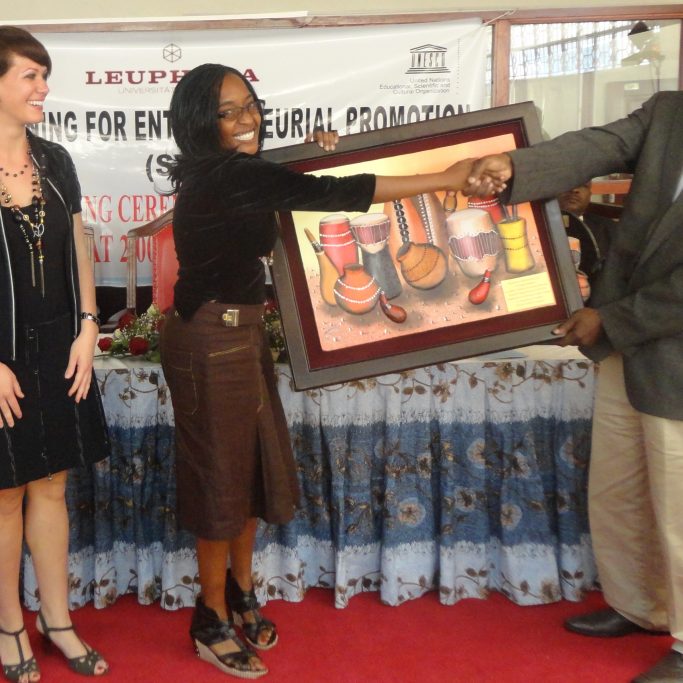
Institutions in South Africa
UNIVERSITY OF LIMPOPO
The University of Limpopo was the first university in South Africa to implement STEP in 2018. It is located in Mankweng in the Limpopo province. The German Commission for UNESCO supported the project and it was an important step to expand the training to another country and context. After two successful implementations in 2018 and 2019, STEP was extended to include the topic of sustainability for the third round of training in 2020. This was the first implementation of STEP S, a training version that promotes entrepreneurial and sustainability-oriented thinking and aims at creating entrepreneurs that solve societal or environmental problems in particular. Three former STEP trainees from the University of Limpopo became facilitators for the third round of training, which indicates the high level of commitment and dedication towards STEP that is present at the partner institution. The evaluation included weekly in-depth interviews with training participants. This allowed us to better understand the processes of the training.
UNIVERSITY OF VENDA
The University of Venda was the second university in South Africa to implement STEP. Again, this project was supported by the German Commission for UNESCO. The university is located in Thohoyandou in the Limpopo province and is one of the few universities in the world that is located within a UNESCO biosphere reserve. After our first implementation in 2019, we planned for the second training round in 2020 to include former STEP-trainees as mentors for the current cohort. This development demonstrates that University of Venda is viewing STEP as a continuous process and a building block to consistently promote entrepreneurship. The University of Venda is currently involved in the STEP Sustainability project, funded by the DAAD.
Institutions in Rwanda
UNIVERSITY OF RWANDA
University of Rwanda acting through the School of Finance and Banking in Kigali, Rwanda was part of the wider team starting the project in 2006. The School of Finance and Banking was a co-partner participating in all preparatory workshops that preceded the first implementation of the STEP training. The School of Finance and Banking was thus informed about the conceptual and methodological ideas underlying the STEP training. Consequently, it was easy for the School of Finance and Banking to grasp the idea and implement STEP at its institution. The School of Finance and Banking was involved in all important decisions regarding the STEP training. The School of Finance and Banking can thus be considered as one of the founding partners of the STEP training. Having the School of Finance and Banking as a partner from Rwanda was important to make sure that the STEP training meets the requirements for a training that is applicable in the wider context of East African countries.
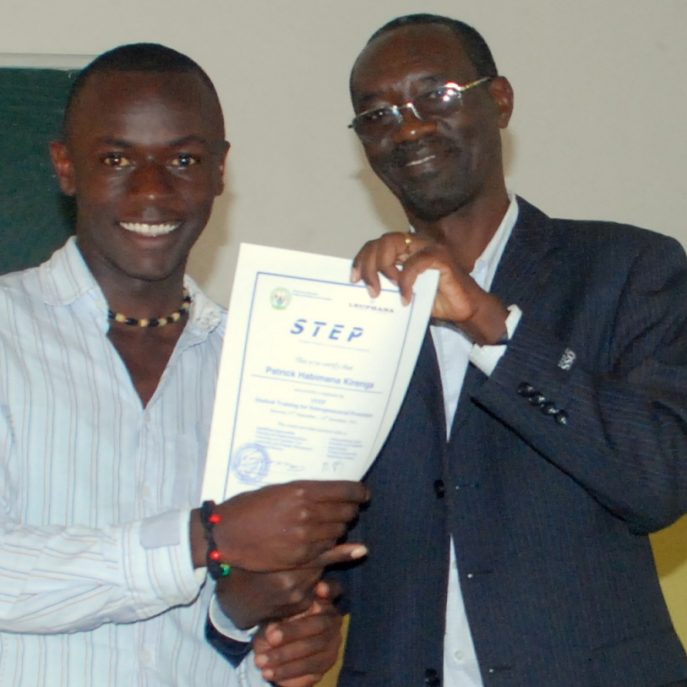
Institutions in Tanzania
UNIVERSITY OF DAR ES SALAAM
University of Dar es Salaam was one of the international co-partners participating in the STEP project since its beginning in 2006. University of Dar es Salaam has participated in all workshops to develop the STEP training and has provided extremely valuable contributions regarding the internationalization of STEP. In 2013, the STEP training has been implemented at University of Dar es Salaam for the first time. This implementation featured the first scientific evaluation of the STEP training-of-trainers workshop. The evaluation included a full video coverage of the workshop and all training sessions. This allowed us to conduct an in-depth examination of the processes in the training-of-trainers workshop as well as the training sessions leading to the positive effects of STEP. The project at the University of Dar es Salaam continues on a regular basis with several follow-up studies to assess students’ long-term success.
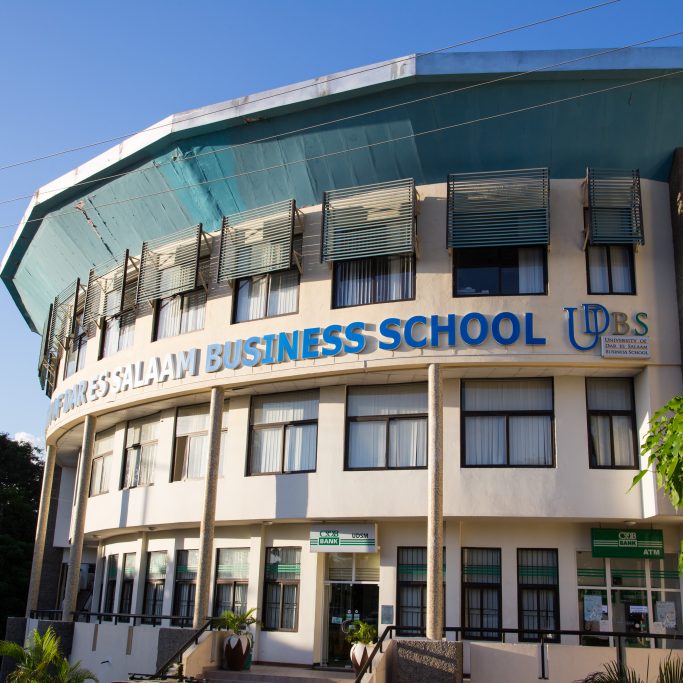
Institutions in Liberia
UNIVERSITY OF LIBERIA IN MONROVIA
The implementation of the STEP training at University of Liberia constituted a milestone in the history of STEP for several reasons. First, the project at University of Liberia was the first project that was supported by the German Commission for UNESCO. The German Commission for UNESCO was the main driver in initiating and sustaining the project in Liberia. The German Commission for UNESCO financially supported the project and established the relationship with the National Commission for UNESCO in Liberia as well as the University of Liberia. Second, the project in Liberia was the first STEP training that was conducted outside of Uganda. The project thus showed that the STEP training can be applied in different international contexts and is not only useful for countries in East but also in West Africa. Third, the STEP training at University of Liberia was the first training in which the trainers were not involved in the development of the STEP training. This means that the concept, content, and methodology of the STEP training were all new to the trainers. It was essential to develop a train-the-trainers workshop to familiarize the team of trainers from the University of Liberia with the conceptual ideas underlying STEP. The trainers took part in a three-day train-the-trainers workshop to become certified STEP trainers. The evaluation study showed that it is possible to train a team of trainers in a workshop in a way that they grasp all the essential ideas of STEP and transfer them to the students attending the training. Finally, the project at the University of Liberia was the first implementation that took place according to a three-year cycle in which the University gradually takes over the management of the training. At the end of the cycle, the university is able to run and finance the training by its own and train new lecturers without any external support by the Leuphana team.
Institutions in Nigeria
GODFREY OKOYE UNIVERSITY
The Godfrey Okoye University has more than 3,000 students and is located in Enugu, Nigeria. The cooperation with Leuphana University is ongoing since 2018 when STEP was implemented for the first time. It has established a Center for Research and Entrepreneurship and plans to extend entrepreneurship training programs to secondary schools. The Godfrey Okoye University is currently involved in the STEP Sustainability project, funded by the DAAD.
Institutions in Lebanon
AZM UNIVERSITY
The AZM University was the first university in Lebanon – and generally the first in an Arabic country – to implement STEP. Located in the country’s second largest city, Tripoli, AZM University implemented STEP for the first time in 2019. Funded by the DAAD, this project aims at establishing a network of universities to jointly foster entrepreneurship education in Lebanon. It remarks an entry point to establish an entrepreneurship track at AZM University and to prepare students for extra-curricular activities in terms of national and international entrepreneurship competitions. After the first successful implementation in 2019, the Arab Open University joined the project in 2020 to implement STEP at both universities. It was the first ever implementation of STEP in a synchronous but virtual learning style. The vital exchange between researchers and project coordinators from all involved institutions demonstrates the great interest in further promoting entrepreneurship and entrepreneurship education in Lebanon.


